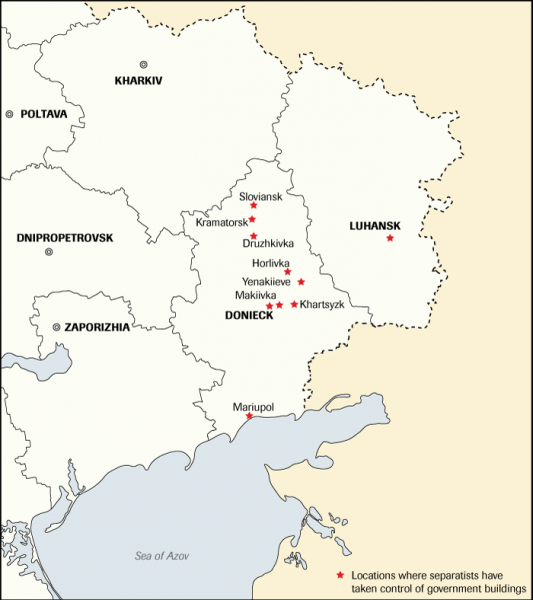Ukraine closer to losing the eastern part of the country
In recent days separatists have taken control of government buildings and police in several cities of the Donetsk region; in at least two of them (Sloviansk and Kramatorsk), the separatists have been backed by armed forces of the Russian Spetsnaz without insignia. In almost all these places, the separatists’ actions have been accompanied by either passivity or the open support of the local police, and acceptance on the part of the residents. In response, on 13 April the government in Kyiv decided to take action using limited force in Sloviansk, but this action ended in failure, and after a few hours the Ukrainian forces were withdrawn. A small-scale action on 15 April did lead to the recovery of Kramatorsk airport by Ukrainian forces.
The separatists’ actions in eastern Ukraine were clearly professionally prepared and carried out as a special operation. In addition to support from Russia, another key factor determining the separatists’ success so far has been the support of a significant part of the local power elite, including some oligarchs, the structures of the Party of Regions and the Communists, as well as members of Viktor Yanukovych’s family, who in recent weeks have earmarked substantial funds to destabilise the situation in the eastern regions.
The government in Kyiv announced a counter-terrorism operation and the involvement of the army, but have refrained from using the latter on a larger scale. On the one hand, the centre’s indecision and lack of effective action is the result of a lack of consensus within the ruling elite on how to solve the crisis, and on the other hand results from pressure from the EU and the US on the Ukrainian authorities not to escalate the situation, i.e. by the use of armed force.
Although Kyiv has still not fully lost control of the situation in the eastern part of the country, in the next few days the separatists are likely to extend their activities to other regions of eastern and southern Ukraine. Russia’s idea is to put pressure on both the West and the Ukrainian government to adopt its conditions for resolving the crisis (including the adoption of federalism) – a crisis which has been artificially created by some local elites, and by Russia itself.
The separatists’ offensive
On 12 April, the separatists, who a few days earlier had taken control of the government HQ in Donetsk and the Ukrainian Security Service (SBU)’s offices in Luhansk, extended their activities to smaller towns in the Donetsk region. This started in Sloviansk, where a branch of the Russian Spetsnaz took over the police building. Then a group of armed separatists (numbering up to a few hundred people) occupied government buildings in other locations (see map). It is not clear how many Russian special forces are involved in the east of Ukraine, and it is still possible that not all of them have been revealed. The aim of the current diversionary action was to take control over rail and road links, and to encourage anti-government sentiment. In their official requests, the separatists have demanded a referendum on the region’s self-determination and giving Russian the status of a state language.
The separatists’ actions followed an identical script in each town: a few dozen ‘activists’ from out of town occupied the buildings, with the support of locals, and meeting no opposition from the local security forces. Some slight resistance from local police officers was offered during the assault on the police headquarters in Horlivka.
Despite a significant rise in public discontent (which also has its roots in discontent at economic conditions), and the lack of acceptance for the new government in Kyiv, most of the region’s population do not support the separatists’ demands, and are in favour of remaining a region of Ukraine. According to polls taken at the end of March, 53% of residents of the east of the country wanted to maintain the unitary system, and 26% favoured a transition to a federal government. The emergence of armed separatists, however, has seriously distressed a large proportion of the usually passive Donbas public. Small rallies in support of the unity of Ukraine were held, albeit in only a few places (including Luhansk and Mariupol). However, in most cities of the Donbas, including Donetsk, life is proceeding as normal, and the occupation of several buildings has not affected the normal functioning of these cities.
All the indications are that the separatists’ actions are being supported by a large part of the local power elite, including Rinat Akhmetov, the richest and most influential person in the country’s east. His statements show that he supports the idea of the region’s autonomy; he has declared himself in favour of negotiations with the separatists, and opposes the use of force by Kyiv. The separatists’ activities have also been openly supported by some deputies from the Party of Regions and the Communist Party. The lack of response from the local police and SBU branches means that Kyiv has effectively lost control of them, and that they are now subordinate to the local elites.
The Kyiv government’s ineffective actions
The limited military action taken by the authorities on 13 April against the separatists in Sloviansk ended in failure (one Ukrainian soldier was killed and others injured). Despite the ultimatum and the announcements that wide-ranging action would be undertaken by the armed forces, Kyiv is still shying away from resorting to active measures. On 15 and 16 April, the authorities decided to deploy troops to Sloviansk and Kramatorsk; they retook the airport in the second village from the separatists, but these were still very limited actions, and displayed no real ambition to regain control of the two cities.
Kyiv’s indecision follows, firstly, from a growing dispute within the government, which fears that military action could lead to open, armed aggression by the Russian army on the territory of Ukraine, and that anti-government and anti-Ukrainian sentiment in the eastern regions could rise yet further. On the other hand, Western countries are exerting pressure on the authorities in Kyiv, persuading them not to use force and to resolve the conflict through negotiations.
On 14 April, the acting president Oleksandr Turchynov said he did not rule out the possibility of holding a referendum on the question of whether to maintain a unitary system or transfer to a federal government. The Central Election Commission said that from a technical point of view, a referendum could be organised on May 25, together with the presidential election, but it would require the adoption by parliament of an appropriate legal basis. In response, the Russian foreign minister Sergei Lavrov said that the key issue is the wording of the referendum question, which must take place in consultation with the eastern regions.
Prospects for further development
In the face of the four-party negotiations (Ukraine, Russia, the EU, the US) in Geneva on 17 April, as well as pressure from the West, Kyiv has decided not to take military action against the separatists, and it now seems unlikely that it will issue any such order. This in turn is due to pressure from Moscow, which has warned that the use of armed force by the Ukrainian authorities will lead to the meetings being called off, and will contribute to the further escalation of the crisis.
The consequences of Kyiv’s lack of response include a deepening dispute within the ruling elite, and the continued growth of social discontent. The authorities have already suffered a loss of face due to their lack of effective measures, and their procrastination has only deepened the crisis. At the same time, the lack of response to the widening activities of the separatists threatens a total loss of control over the Donbas, and may lead to similar actions being carried out in other regions of Ukraine, including Kharkov and Odessa.
The development of the Ukrainian crisis, including the possible destabilisation of other regions by actions inspired by Russian separatists, will depend on whether Kyiv accepts Moscow’s demands. The most important of these is the demand for de facto regime change, with significant federal autonomy for the eastern and southern regions, including the right to sign international agreements. It seems unlikely, however, that the negotiations in Geneva will bring about any consensus between the parties, as Moscow and Kyiv are entering the talks with different intentions. From the Ukrainian government’s point of view, the meeting is primarily intended to serve as a passing of judgement on Russia’s actions, and not to discuss the adoption of the Russian demands. Thus, after the likely failure of the Geneva negotiations, we should expect further attempts by Russia to destabilise the eastern and southern regions in order to exert more pressure on Kyiv and the West to accept their conditions.
Map






